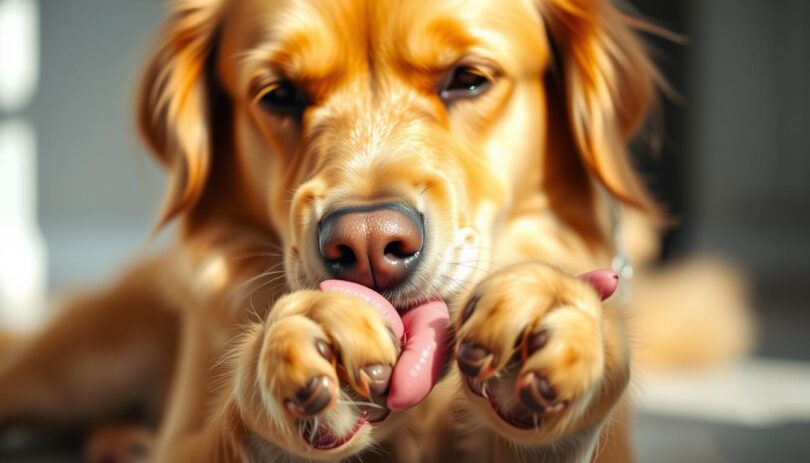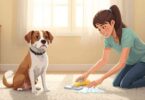Have you ever seen your furry friend licking his or her paws endlessly? Although licking a paw now and then can be included in their self-grooming process, excessive and severe licking of the paws can be an indication of underlying problems that require intervention. It is normal to be worried when as a pet owner you notice this behavior.
Dogs are natural lickers to clean themselves. Nevertheless, the excessive one can point out to injuries, infections, and even allergies. Environmental irritants and stress can also trigger this behavior. It is important to learn these signs to know whether a vet visit is required.
Licking of paws can be caused by physical discomfort as well as emotional distress. Monitoring changes in their behavior over time is essential. Being alert will help you keep your pet healthy and fix any health issues in time.
Recognizing Normal vs. Excessive Paw Licking
It is normal that dogs lick their paws but it is important to note the difference between natural grooming and bad habits because it can affect the health of your pet. The knowledge of these differences will guide you on when to consult an expert.
Signs of Healthy Self-Grooming
Licking of the paws is normal in a dog as a way of grooming. It helps remove dirt and keep their nails clean. Healthy behavior is usually manifested by some occasional licking but without any visible skin changes.
Indicators of a Problematic Behavior
Excessive licking may signal an underlying issue. Look for redness, swelling, or broken skin. Repetitive licking which is usually caused by anxiety or boredom is also a sign of a problem. When your dog persistently licks even when distracted, then there might be a problem behind it.
When there is more itching or discomfort, a veterinarian should be visited. Proactive observation ensures early detection of potential health concerns.
Understanding Dog Licking Paws: Common Causes
Too much paw licking in dogs may be caused by numerous medical and physical reasons. These underlying causes are important in order to deliver the appropriate care and treatment.
Injuries and Physical Discomfort
Injuries are a leading cause of excessive paw licking. This may be the result of sharp objects, rough surfaces, or even small cuts that can be painful and force your dog to lick the painful spot. Another typical offender is arthritis and joint pain, where a dog will concentrate on a single paw in order to get relief. It is important to look at the nail and pad regions to check the presence of injury.
Allergies, Dermatitis, and Secondary Infections
Skin reactions and dermatitis are common results of allergies and food allergies. These conditions can cause significant discomfort, prompting excessive licking. Also, continually wet environment due to licking may lead to bacterial or yeast infections. In case you think there is some physical discomfort, it is important to visit a veterinarian to avoid complications.
Close observation may help to identify the cause of licking; be it an acute injury or a chronic condition. The knowledge of these causes is important when choosing the appropriate treatment option in relation to the well-being of your pet.
Environmental & Dietary Factors Affecting Your Dog
The environment in which your dog lives and the diet it consumes can have a great impact on its health and this aspect can directly affect the paw licking behavior. External factors and food preferences may cause allergies, infections, and pain, and it is necessary to pay attention to them.
Impact of Food Allergies and Chemical Exposures
Dogs are allergic to certain foods and this can result in skin irritations and licking. Ingredients like dairy, beef, and wheat are common culprits. Such allergies may lead to redness and itchiness which makes your dog lick its paws continuously. Also, chemical irritants like deicing agents or pesticides can cause your dog skin irritations particularly on the paws, which are more likely to come in contact with these agents.
Role of Parasites and Contamination Risks
A prevalent parasite, fleas can be a great source of discomfort to dogs. The bites usually cause itching that can cause excessive licking. Flea prevention is essential to prevent this problem; it should be done regularly. Skin infections may also be worsened by contamination at home, e.g. mold or bacteria. These risks can be reduced by keeping the environment of the dog clean and also washing the paws of the dog after going out.
Ingredient lists should be reviewed because some pet products may have allergens. Paw licking can be minimized by controlling the diet and the environment of your dog so that the incidence and the intensity of the episodes are lower. To get more specific recommendations on how to resolve these problems, go to this source to get all the advice.
Behavioral and Emotional Drivers
Other than the physical, emotional reasons are also a common factor as to why dogs lick their paws. Common triggers are anxiety and boredom, which results in the compulsive licking as a self-soothing behavior.
Anxiety, Boredom, and Compulsive Licking
The stress or lack of stimulation may make the dogs lick their paws. This compulsive habit may turn into a soothing ritual, giving short-term relief of emotional distress.
Coping Strategies and Behavioral Adjustments
To overcome this, think of walking and playing games to keep them entertained. Compulsive behaviors can also be diminished through mental stimulation and environmental enrichment, which makes your dog feel safer and more involved.
In case the behavior becomes worse, it is recommended to visit a veterinarian or a behavior specialist. A combination of behavioral changes and appropriate exercise will greatly enhance the well-being of your dog.
Treatment Options and Preventative Solutions
To overcome the problem of excessive licking in the paws, it is important to combine both professional veterinary treatment and effective at-home remedies. It is necessary to check in with a vet and run a full check-up to determine the underlying cause, be it an injury, infection, or allergy. They can prescribe drugs or creams to relieve pain and avoid future problems.
Veterinary Care, Medications, and Professional Guidance
Your vet may prescribe anti-inflammatory drugs or antibiotics to counter infections. When arthritis occurs, pain management strategies may alleviate the pain of your pet. Frequent visits will make the treatment effective and changed accordingly.
At-Home Remedies and Lifestyle Modifications
At home, you may apply special shampoos and soaks to relieve irritated skin. A change in diet, including the removal of possible allergens can also have a huge impact. Minor changes in lifestyle, such as washing your dog paws after walks and giving them a suitable place to rest, will minimize the irritation and avoid excessive licking.
Consistency is key. Follow the treatment regimen prescribed by your vet to prevent chronic problems. With the help of professional advice and care at home, you will be able to make your pet feel better and avoid future issues. By doing so, you will make your dog feel more comfortable and help it in the long run.
Wrapping Up: Ensuring a Healthy Future for Your Pet
To make sure that the health of your pet will be preserved in the long term, you need to be proactive about treating paw licking. Such behavior may have different reasons such as allergies, injuries, infections, or even emotional distress. It is necessary to distinguish between normal grooming and excessive licking because the latter may indicate some underlying problems that should be addressed.
Early intervention is crucial. Be it treating an infection, treating allergies, or treating emotional triggers, early intervention can help avoid complications. A veterinarian is needed to help diagnose the underlying cause and develop a successful course of treatment. This might include medications, dietary changes, or at-home remedies.
Veterinary check-ups are essential to the health of your pet. You can prevent the development of chronic conditions by remaining alert and adhering to preventative measures. In case you observe regular licking or other distressing symptoms, do not be afraid to consult a specialist. The first step to a healthy future of your pet is being vigilant and taking good care of your pet.
To get a more detailed advice on how to handle the health of your pet, go to this resource to learn more detailed tips and solutions.
FAQ
Why do dogs lick their paws?
There are several causes of dogs licking their paws such as self-grooming, pain, allergies, or even boredom. It is necessary to keep track of the frequency and circumstances to understand whether it is a regular way of behavior or the symptom of a hidden problem.
What should I do to know whether my dog is licking his paws normally?
Normal licking is normally occasional and does not result in redness or swelling. In case your dog over-licks, particularly when it causes irritation or infection to the skin, it could be a sign of a problem that requires intervention.
Which are the most typical reasons of licking the paws in dogs?
The most frequent causes are allergies (food or environmental), injuries, infections (bacterial or yeast), flea bites, and skin disease such as dermatitis. Anxiety or boredom are also behavioral factors that may be involved.
Can food allergies cause paw licking in dogs?
Yes, skin irritation and itching are possible outcomes of food allergies, and they can make your dog lick his or her paws more. Allergenic ingredients in their diet can be identified and eliminated to solve the problem in many cases.










Leave a Comment